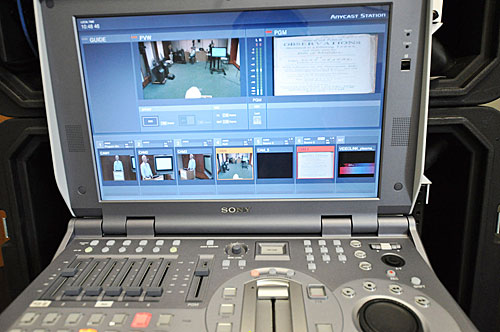Harvard launches two free online courses, more than 100,000 sign up worldwide
October 19, 2012

Rather than just broadcasting full lectures on the Internet, the HarvardX classes incorporate short video-lesson segments, along with embedded quizzes, immediate feedback, student-ranked questions and answers, online laboratories, and student-paced learning (credit: Aubrey LaMedica/Harvard School of Public Health)
Harvard University’s first two courses on the new edX digital education platform launched this week, as more than 100,000 learners worldwide began taking dynamic online versions of CS50, the College’s popular introductory computer science class, and PH207, a Harvard School of Public Health course in epidemiology and biostatistics.
For Marcello Pagano, a professor of statistical computing who is co-teaching PH207x, the potential to teach so many students at once is amazing. “I figure I’d have to teach another 200 years to reach that many students in person,” he said.
In May, Harvard and the Massachusetts Institute of Technology (MIT) announced the launch of the not-for-profit educational enterprise edX, which features learning designed specifically for interactive study via the Web.
Since then, Harvard has established HarvardX, a University-based organization that supports Harvard faculty as they develop content for the edX platform.
Although online courses have been around for years, the professors working with the platform say that HarvardX forces them to get creative about crafting more-active learning environments.

“I figure I’d have to teach another 200 years to reach that many students in person,” said Harvard Professor Marcello Pagano (pictured), after learning that more than 100,000 people worldwide had signed up for the two Harvard courses being taught on the edX platform (credit: Aubrey LaMedica/Harvard School of Public Health)
Not streaming lectures
Rather than just broadcasting full lectures on the Internet, the HarvardX classes incorporate short video-lesson segments, along with embedded quizzes, immediate feedback, student-ranked questions and answers, online laboratories, and student-paced learning.
Certificates of mastery will be available for those motivated and able to demonstrate their knowledge of the course material.
“This is the future,” Pagano said. “What you have in classrooms today, I think of as a play. What we have now, with HarvardX, is the movie. You can swap out scenes, edit, perfect it. This is the way we communicate now.
“They can stop a lecture in the middle and ponder a concept,” he said. “They can replay if they don’t understand something, and they can speed up when they grasp something quickly. You can’t do that in a lecture hall with 100 students. This is much more individualized.”
For CS50x instructor David Malan, director of educational innovation and manager of pedagogical innovation, being able to produce short videos on key concepts means that students get a more consistent, polished experience than might work in a lecture hall. The library of lectures also liberates him to explore other concepts and go more in-depth in his on-campus class.
“I don’t see the lecture or section going away,” he said. “Rather, students can choose the learning process that works best for them, and have the option of exploring other topics even if we don’t have the time to cover them in class.”
Improving instructional methods
But students aren’t the only ones who stand to learn through edX. The platform will provide a trove of data for Harvard and MIT researchers, who will study patterns of student achievement in the hope of making course material and methods more effective for students both on and off campus. Concrete data from large samples will be a lot easier to read than the puzzled expressions an instructor might see in a lecture hall.
“It’s very exciting to have tools to give us insights into patterns of behavior,” Malan said. “The data will allow us to make statistically significant inferences that aren’t always possible with smaller samples.”
Members of the HarvardX leadership team are enthusiastic about the edX partnership’s potential to transform pedagogy in classrooms and living rooms in Massachusetts, across the nation, and around the globe.
“As well as expanding access to high-quality, online learning content for new communities of learners, we believe that edX will strengthen the on-campus learning experience,” said Dean Michael D. Smith of the Faculty of Arts and Sciences (FAS) and a member of the edX board of directors. “For instance, if you sit in the back of a classroom today, you’ll see that students are already using technology to learn. EdX gives faculty the tools to think in new ways about the role technology plays in their teaching and creates new opportunities for research that can form the basis of more effective teaching and learning methods.”